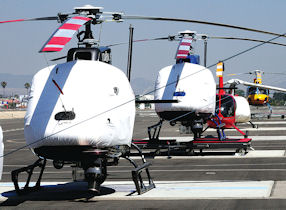For over 20 years, I have been a helicopter pilot in Los Angeles. My company employs approximately 40 individuals in the San Fernando Valley. I am a business owner, and as such, I try to take a reasonable look at all issues that could affect the operations of my business and the 40 individuals I am able to employ. Recently, Rep. Adam Schiff, D-Burbank, and Sen. Dianne Feinstein were able to circumvent the normal legislative process by inserting a provision into the Consolidated Appropriations Act (H.R. 3547) that was passed on Jan. 15. This provision will likely force the FAA to create regulations that will detrimentally affect the helicopter operators in Los Angeles by putting restrictions on flights and other operating activity that previously had not been an issue, except to a very small but highly vocal minority in Los Angeles. A new federal law might make sense if the political leaders had first gone to the helicopter community to inquire about helicopter noise and address the facts. Such action should have occurred before penning legislation, but it did not. Schiff’s predecessor representing the 28th congressional district, Howard Berman, initially tried to generate legislation to restrict helicopter activity after he read an article by a New York Times reporter and upon getting complaints from his vocal constituents. Congress ordered the FAA to analyze and investigate this matter. After a very expensive and time-consuming study, the FAA issued a thick report in May 2013. According to the FAA study, voluntary efforts between homeowners groups and helicopter operators represented the course of action that would achieve the best results. The FAA’s recommendation was not acceptable to a very small sliver of the populace of Los Angeles, coincidentally some located in Schiff’s district, so the movement continued. The helicopter operators have made good faith efforts to work with homeowners groups. The real question is why new federal laws should be necessary at all? Helicopter noise is not a new issue in Los Angeles. It is part of the urban landscape that we live in and is no louder than a siren going by on its way to an emergency. As residents of Los Angeles, we hear countless sounds like these every day. Residents and politicians use inflammatory terms when describing helicopter pilots like “bad actors” and “culprits” as if to say that the pilots themselves are doing something wrong. I hear complaints about the paparazzi looking into windows and the news media covering “carmageddon” (long past) and early morning traffic events. We heard about the Hollywood Bowl being disrupted by helicopter flights, only to find out that the flights were conducted by the U.S. Army (very likely exempt from any legislation). Most of the “intrusive” helicopter noise is not ill-intentioned; oftentimes it stems from efforts to improve the quality of life. Law enforcement gets a fair amount of the noise complaints, but they should not be criticized. They are doing their jobs to protect the life and property, often of the very folks who are complaining about the helicopters. These flights are being performed by professional, well-trained pilots and support crews who are attuned to the concerns of everyone on the ground – including those few for whom any noise is a bad noise and who are inclined to stop at nothing before regulating helicopters companies out of business. Schiff’s provision affects all helicopter operations, including law enforcement, fire and rescue. Despite earlier assurances last year to the contrary, that there would be exemptions for emergency, law enforcement, and military. Can the situation get better? Of course it can. In fact, members of the helicopter industry in Los Angeles have recommended that there be a tracking mechanism in place so that all sides of the issue can get accurate information about who is flying, and perhaps more importantly, why helicopters are in the area in question. This information might ease the tensions among those who are the harshest critics. The tracking software exists but it comes at a price. It would cost around $30,000 for the first year and get less expensive each year after that. There is always room for improvement but I wonder why the federal government is taking action when there is an industry of professionals that have proven their willingness to work with the community. Perhaps Schiff can help raise the funds by redirecting some of the federal dollars wasted creating a new law into helping all sides of the issue with the purchase of tracking and information-gathering systems required to get the facts to logically and rationally study this complicated issue. Larry Welk is president of Angel City Air in Pacoima and past president of the Professional Helicopter Pilots Association of Southern California.
